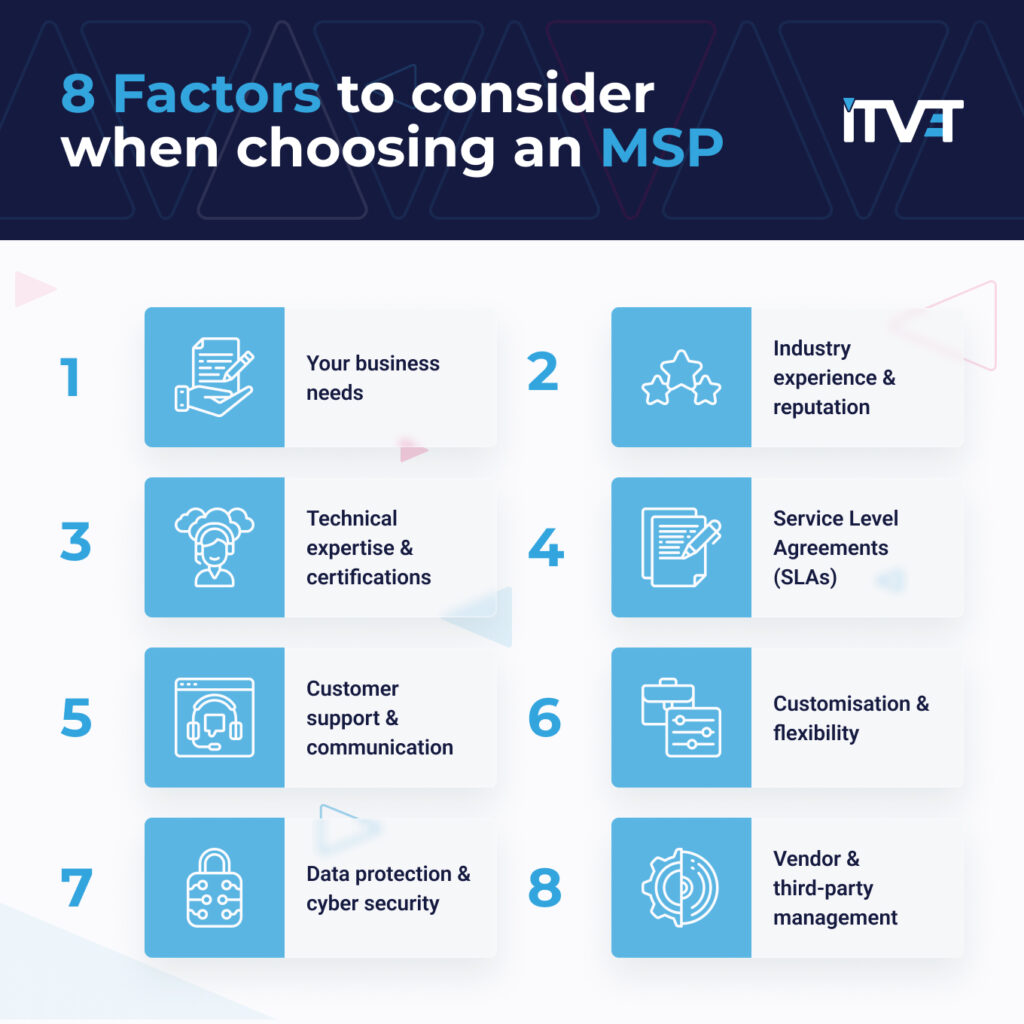Enter your email address to receive the latest ITVET news, market insights, and useful IT tips.
Businesses rely heavily on technology to drive growth, improve efficiency, and maintain a competitive edge. As a result, the demand for IT support has grown exponentially, prompting many companies to turn to Managed Service Providers (MSPs) to meet their technology needs.
Choosing a managed service provider that’s right for your business is crucial for success. But with so many IT providers, how can you be sure you’re selecting the best one for your needs? In this article, we’ll show you how to choose a managed service provider by walking you through the key factors to consider. We’ll help you make a confident, well-informed decision and select a partner that truly supports your business goals.
8 Factors to consider when choosing an MSP
1. Your business needs
The first step in choosing an MSP is understanding your unique business needs. Your requirements may vary depending on the size of your business, industry, and the complexity of your IT infrastructure. A clear understanding of your requirements ensures you choose an IT provider that aligns with your goals and can support your business effectively.
Consider the following:
Business size and growth
Larger businesses may require more advanced and customised IT solutions, whereas smaller businesses might only need basic IT support.
Thinking long-term is crucial when selecting an MSP. If your company is expanding, it’s important to ensure that the MSP can grow with you. They should have the ability to upgrade services, add new infrastructure, and integrate emerging technologies without causing disruptions.
Business hours
If your business operates beyond standard working hours or relies on constant IT support, a 24/7 service desk is essential. An MSP that provides round-the-clock IT support helps prevent costly downtime and keeps your operations running smoothly.
Specific services required
MSPs offer a wide range of services, from 24/7 service desk support to network management, connectivity, cloud computing, cyber security, backup and disaster recovery, and IT consulting. To find the right IT provider, make a list of the services your business requires, considering both current and future needs. This will help you identify your core IT requirements to help streamline your search for the right MSP.
Industry-specific requirements
Some industries, such as property management, hospitality, and retail, have strict regulatory requirements and operational challenges when it comes to data security, privacy, and system reliability. Partnering with an MSP that’s familiar with your industry’s regulatory and operational landscape ensures your systems are secure, compliant, and optimised for performance. With the right support, you can avoid downtime, meet industry-specific standards, and focus on growing your business.
2. Industry experience & reputation
When selecting an MSP, industry experience matters. IT needs can vary significantly between sectors, so it’s important to choose a provider with a proven track record in your industry. An MSP with relevant experience will better understand your challenges and offer tailored, strategic support.
For example, a common challenge for property management companies is building systems integration. An MSP familiar with managing these systems remotely is crucial for ensuring energy efficiency, minimising downtime, and enhancing tenant satisfaction.
What to look for:
- Real-world examples: Ask for case studies and testimonials from clients in your industry.
- Credibility: Read online reviews and client feedback. Look for comments on response times, issue resolution, customer service, and overall performance.
3. Technical expertise & certifications
A reputable MSP should have industry-recognised certifications and strategic partnerships that showcase their technical knowledge. An MSP with certifications from industry leaders like Microsoft and Cisco ensures your business receives the technical support required to maintain reliable and secure IT systems. These credentials serve as proof that the MSP follows best practices, stays up to date with evolving technology, and meets industry security standards.
4. Service Level Agreements (SLAs)
Service-Level Agreements (SLAs) outline the level of service you can expect from your MSP. It’s crucial to review these agreements carefully to ensure the terms align with your business needs and expectations. Pay close attention to response times, system uptime guarantees, and performance metrics.
For example, an SLA for a managed commercial property might guarantee 99.9% uptime for critical systems like HVAC, lifts, and access control systems. It could also specify a response time of 30 minutes for urgent maintenance requests, such as cyber security breaches or lift malfunctions. Additionally, ensure the SLA includes provisions for 24/7 IT support, especially if your property operates with tenants who require round-the-clock services.
5. Customer support & communication
Your MSP should feel like a true business partner, not just a service provider. Reliable communication and responsive support are essential for efficiently resolving IT issues and staying ahead of potential challenges.
Transparent communication builds trust and keeps you confident in your IT strategy. Your MSP should be easy to reach, clear in their recommendations, and proactive in ensuring smooth IT operations. A good MSP communicates in straightforward terms, avoiding unnecessary technical jargon. If they struggle to explain services in simple language, they may not be the right fit for long-term collaboration. Clear communication is key.
A proactive MSP will regularly assess system performance, security posture, and future IT needs to identify potential risks and opportunities for improvement before they become issues. You’ll have a dedicated account manager to guide you every step of the way, providing regular check-ins to ensure you’re always informed, supported, and aligned with your business goals.
6. Customisation & flexibility
Every business has unique needs, so a one-size-fits-all approach won’t work when it comes to IT support. This is especially true for property management companies, where specific IT requirements are tied to building systems, tenant needs, and regulatory compliance.
Avoid MSPs that push standardised packages. A good MSP will take the time to understand your business model, workflows, and pain points. This insight enables them to deliver tailored IT solutions that align with your unique business needs and provide real value.
Additionally, IT needs evolve over time. That’s why it’s important to choose an MSP that offers scalable and adjustable contracts, rather than rigid, long-term agreements. A flexible MSP will be better equipped to support your business as it grows and your IT needs change.
7. Data protection & cyber security
Cyber security should be a top priority for any business, and it’s especially important when selecting an MSP.
Look out for:
Cyber security expertise
Ensure the MSP has dedicated cyber security specialists with certifications like Cyber Essentials. Additionally, they should have a robust strategy that aligns with frameworks such as ISO 27001 and Zero Trust. These certifications and frameworks highlight the MSP’s commitment to strict information security and risk management protocols.
Compliance
Your MSP should be equipped to assist with audits and compliance requirements specific to your industry. If your business operates under strict regulations like GDPR, your MSP must understand these requirements and help you stay compliant by providing necessary reports, security measures, and policy updates. A security-focused MSP will proactively defend your business against cyber threats while ensuring you meet all compliance obligations.
Multi-layered protection
The MSP should provide comprehensive, multi-layered protection for complete peace of mind. This includes endpoint security, malware protection, firewalls, proactive monitoring, intrusion detection, data encryption, secure access controls, and regular penetration testing.
8. Vendor and third-party management
If your business relies on multiple external service providers, vendor and third-party management can be a valuable service. This involves the MSP acting as an intermediary between your business and your vendors – whether for software, hardware, or telecommunications services.
A good MSP will handle contract negotiations, ensure SLAs are met, and manage any issues or escalations with third parties. Choosing an MSP with this capability can streamline operations and reduce the administrative burden of managing multiple vendor relationships.

Choose ITVET as your strategic IT partner
We know it can be difficult deciding how to choose a managed service provider. Let us make it easy for you. At ITVET, we bring years of experience, industry-recognised certifications, and a team of certified experts to help you make the right choice.
We offer a comprehensive range of IT services, including a 24/7 service desk, network management, cloud solutions, cyber security, connectivity, and IT consultancy. Our proactive approach to IT management ensures your systems remain reliable, secure, and optimised for performance. Plus, our dedicated team handles the complexities of vendor relationships, so you can focus on what matters most – growing your business.
Through strategic partnerships with industry leaders like Microsoft, Cisco, and Trend Micro, we stay at the forefront of technological advancements. This allows us to provide you with the most innovative and effective solutions for your business.
Ready to take the next step? Contact us today to discover how ITVET can become your trusted IT partner and help you navigate the complexities of modern business technology. We’re committed to ensuring your IT infrastructure is secure, scalable, and always working for you.



